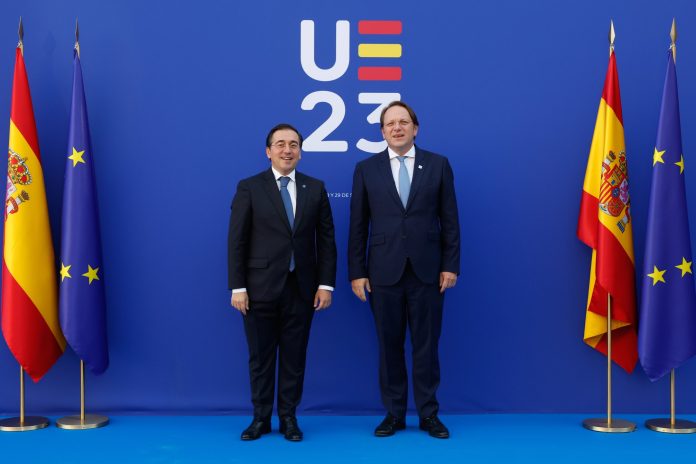European Union governments are discussing ways to upgrade EU decision-making and finances as part of current efforts to broaden the bloc’s membership.
The European Commission said it would propose cash and EU market access for candidate countries to help speed up the membership process after EU affairs ministers met in Murcia, Spain, in preparation for the upcoming 5-6 October EU summit. Spain currently holds the rotating EU presidency.
Enlargement is one of the “major challenges” the EU faces, Spain’s Foreign Minister, Jose Manuel Albares, told a news conference after the ministerial meeting.
Turkey, Ukraine, Moldova, Albania, Bosnia and Herzegovina, Montenegro, North Macedonia and Serbia have official EU candidate status right now, while Georgia and Kosovo are potential candidates.
EU Enlargement Commissioner Oliver Varhelyi told the news conference that the EU plans making internal reforms in parallel with preparations being undertaken by candidate countries to meet the complex EU entry criteria. To accomplish faster reform, the European Commission (EC) plans to offer candidate countries gradual access to the EU market plus added cash incentives in the coming two weeks, Varhelyi indicated.
Next week’s talks are expected to focus on guidelines drafted by a team of Franco-German academics that suggest a radical overhaul of EU decision-making and funding so that the bloc can accept additional members and do so by a tentative deadline set for 2030.
Decision-making is key given that the EU requires membership unanimity about issues on foreign and security policy, taxes, EU finances, various areas of justice and home affairs and social security and protection. Some governments and experts blame this mandatory requirement for substantially slowing down or even blocking the EU’s development, since it means all relevant key decisions are reduced to the lowest common denominator.
After the preparatory meeting in Madura, Commissioner Varhelyi insisted that, regardless of the inherent challenges, the Commission believes accepting new members should not require changes to EU treaties – a potentially long and complex process that itself requires unanimity.
According to the Franco-German paper, the EU would also have to change its agriculture and regional policies as well as the European budget, if new members were to join.
For example, EU agriculture policy would have to be reconfigured because the admission of an agriculture powerhouse like Ukraine would significantly alter current direct payments to farmers by the EU.
EU regional policy would be similarly affected since poorer EU members receive money to raise their standard of living.
Agriculture and regional funds account for two thirds of the EU budget, which totals roughly 1% of the bloc’s annual gross national income. Worth around a trillion euros in 2021-27, the Franco-German proposals maintain that the budget should be larger. Such a recommendation is likely to be vigorously contested in some EU circles.
When initially reviewed on 19 September, the paper polarised EU governments, especially the proposal that said some countries in the EU should be allowed to form closer ties than others.
This, in essence, would mean forming four tiers of European integration: an inner circle similar to the euro zone using the single currency and the passport-free Schengen travel zone; a second tier consisting of the EU itself; a third, larger tier, made up of Associate Members who would participate in the EU’s single market for goods and services and adhere to common EU principles (along lines mentioned earlier by Varhelyi); and, fourth, the European Political Community, an outer tier for political cooperation, not bound by EU law.

